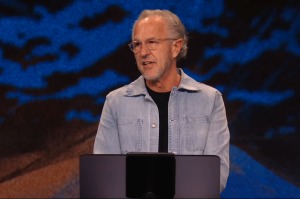Ken Ham: Christian Colleges Compromising Creationism, Bible's Authority
Answers in Genesis President/CEO Ken Ham has new research showing that Christian institutions of higher learning have gone too far gone down the pathway of secularism and they need to be either totally overhauled or scrapped in favor of new biblically-sound schools.
A hunch led him to survey the administration and faculty of 200 U.S. Christian campuses about their views on the authority of the Bible and the creation story versus evolution. A regular speaker on college campuses, Ham could tell that a metamorphosis has been occurring on Christian campuses.
What he found is bound to shock parents who send their children to Christian four-year institutions, he said.
According to data gathered last year by the America's Research Group, only 17.3 percent of Christian institutions surveyed define "authority of the Bible" to mean "you believe everything it says." Other institutions said the Bible is "foundational" (30 percent); "a book of guidelines" (22 percent) or "inspired by God" (21.2 percent).
Additionally, when asked "what does your institution teach about the Bible," only 35.3 percent of respondents said they teach that it is true. The two most popular answers after that were "it is inspired by God" (25 percent) and "it is a book of guidelines"(23.1 percent).
While phrases such as "foundational" and "inspired by God" sound good to prospective students and their parents, Ham says those are newspeak, terms which are used because they sound pleasing, but mean something totally different.
The data shows just how little "inspired of God" means with three follow-up questions. Respondents were asked if they believed in the inspiration, the inerrancy and the infallibility of the Scriptures. While nearly all respondents expressed their belief in the inspiration of the Scriptures (98.1 percent), less than three quarters of respondents (74 percent) affirmed their belief in the inerrancy, or total accuracy, of the Bible. Nearly 19 percent of respondents rejected the belief that the Scriptures are infallible or incapable of failing.
"We're well down the road" of secularism, Ham told The Christian Post.
He and Warner University President Gregory V. Hall sound the warning bell in their newly released book, Already Compromised. The book is a follow-up to Ham's 2009 book, Already Gone. In that book, Ham outlined how the next generation of believers already lost their faith in high school or even as early as middle school, in some cases.
According to the ARG survey in the 2009 book, 95 percent of 20- to 29-year-old evangelicals attended church regularly during their elementary and middle school years. Only 55 percent went to church during high school. And by college, only 11 percent were still attending church.
The statistics only get worse for young Christians who attend a secular four-year college. Hall quoted George Fox University Professor and Researcher Gary Railsback in noting that 52 percent of incoming freshman who identify themselves as born-again Christians upon entering a secular public university will leave four years later either no longer identifying with that title or having not attended church in over a year.
In the latest book, Hall and Ham's take on Christian colleges forces parents and students to take a second look at what has been considered by many to be the last safe place for Christian college students.
Ham said the changes reflected in ARG's 2010 data all started with a small crack in the colleges' theology. That crack, he explained, is the way the institutions teach Genesis, the first book of the Bible. Ham, founder of the Creation Museum, asserted that too many Christian colleges and faculty members wrongly believe that it does not matter whether or not a Christian believes in a literal interpretation of creation (as having taken place in six 24-hour days) and a young earth.
Hall warned that if Christian professors teach youth that it is OK to change the Bible to accommodate evolution or an earth that has existed for millions of years, then students get the idea that it is also OK to undermine the authority of the Bible.
Without the strong teaching of Genesis, it won't be long before Christian students and faculty will be changing the Bible to accommodate other beliefs such as homosexuality and abortion, Ham argued. The young earth creationist asserted that the issue is really about preserving the Bible's authority as 100 percent true. "Until you get back to that issue (the Bible's authority), then you'll never be able to shut the door [on those issues]."
While Ham recognizes that "there are a handful of colleges that will take a stand," he told CP that Christian colleges are on the path to becoming the next generation Harvard, Yale, Dartmouth and Princeton. All four of these Ivy League schools were founded on Christian values. They presently follow a completely secular values system.
When asked, given the data shared in Already Compromised, how long it will be before new conservative Christian colleges must be established to replace "compromised" institutions, Ham responded, "I think it needs to happen right now."
If existing Christian colleges are serious about reform, they need to institute top-down change, he said. "Let the presidents clean house," he proclaimed. Ham also suggested, "The boards need to have people prepared to take a strong stand."
In addition to sobering statistics, Already Compromised also offers parents and students looking for a theologically-sound institution resources such as a list of recommended Christian colleges and a list of the right questions to ask to the right people.
Already Compromised does not specify which of the 200 institutions surveyed gave "compromised" answers in response to the survey questions.
The book was published May 1 and is available through the Answers in Genesis website.





























